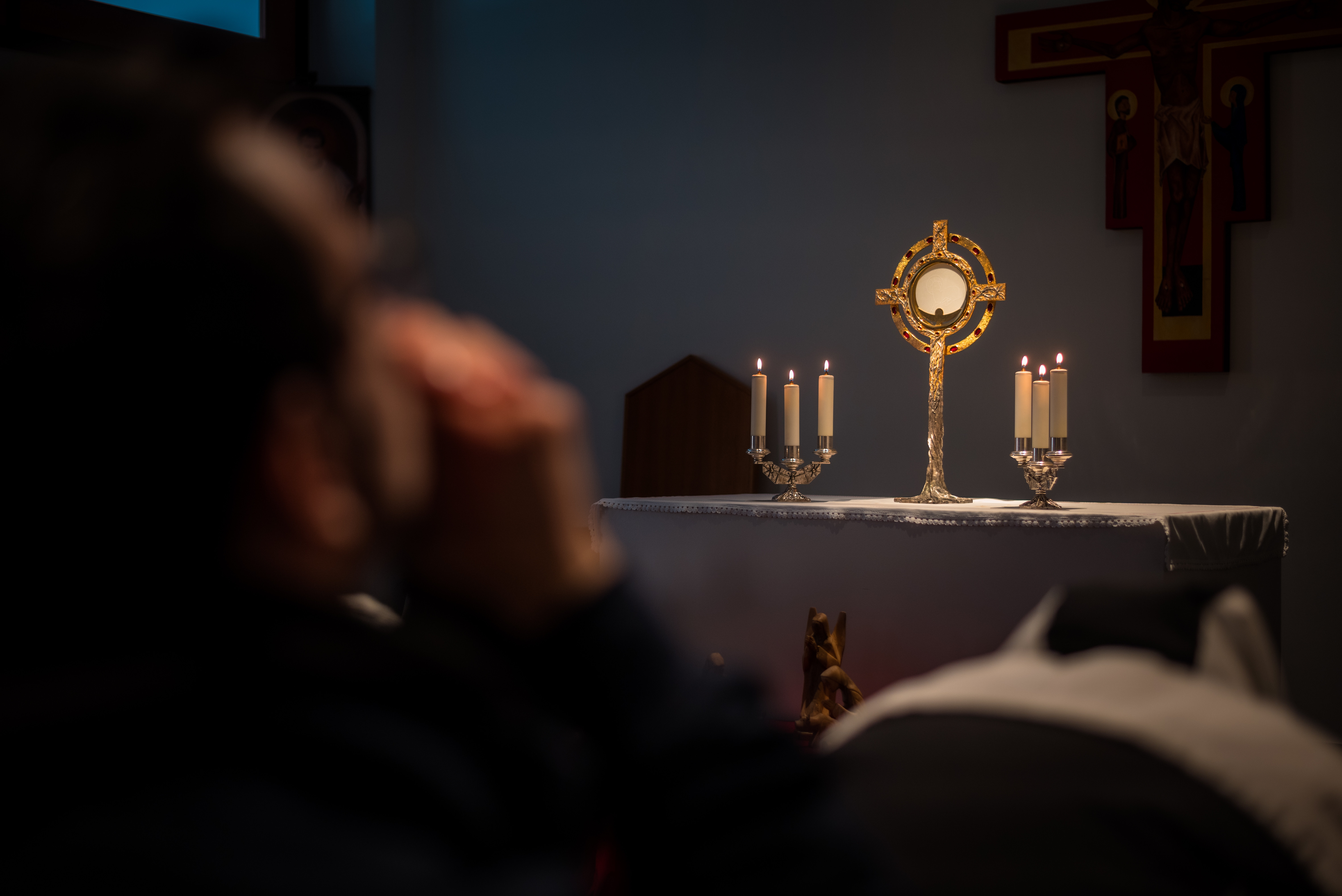Is your parish celebrating this Solemnity with a Corpus Christi Procession? This traditional way of honoring the Eucharist goes back to the 1300’s, and is a beautiful public proclamation of our faith in Christ’s real presence in the Sacrament.
What exactly does our Faith teach about the Eucharist (which comes from the Greek word for “thanksgiving”)? From the very beginning, the Church has understood this Sacrament to be Christ Himself, as he clearly states in today’s Gospel: “My flesh is true food, and my blood is true drink. Whoever eats my flesh and drinks my blood remains in me and I in him.” The earliest effort we know to explain this in writing came in the 2nd century, when St. Justin wrote that this bread and wine are truly the flesh and blood of Jesus: “For not as common bread and common drink do we receive these; but as Jesus Christ our Savior, having been made flesh by the Word of God, had both flesh and blood for our salvation, so likewise… the food which is blessed by the prayer of His word, and from which our blood and flesh by transmutation are nourished, is the flesh and blood of that Jesus who was made flesh.”
Later, the explanation of this change was developed further. We now say that Christ is “really, truly, and substantially present” in the Eucharist. It is really His Presence, it has “real being,” not just mental existence. It is truly the Presence of Christ, not just a symbol or representation. And no matter what our senses tell us, we know that the substance is Christ, who is wholly present – Body, Blood, Soul, and Divinity – in each element and every part of them. In every drop and every crumb, Christ is wholly present: really, truly, and substantially.
This is hard for us to fit into our skulls because it is a mystery. But God certainly must be more than we can understand – if God fit into the confines of our skulls, He would be very small indeed! God is Mystery, and the Gift of the Eucharist is a mystery. But a mystery is not an impossibly locked and sealed door! It is more like an endless series of doors that we continue to open and walk through and find delight in, but which we will never exhaust. There is always more to learn and rejoice in!
So today, let us give thanks and praise to God for all of His gifts, especially the Gift of Himself, remaining with us and nourishing our weary souls in the Eucharist.
As Pope St. John Paul II said, “This is the wonderful truth, my dear friends: the Word, which became flesh two thousand years ago, is present today in the Eucharist.”
¿Su parroquia está celebrando esta Solemnidad con una Procesión de Corpus Christi? Esta forma tradicional de honrar la Eucaristía se remonta a los años 1300 y es una hermosa proclamación pública de nuestra fe en la presencia real de Cristo en el Sacramento.
¿Qué enseña exactamente nuestra Fe acerca de la Eucaristía (lo cual proviene del griego y significa “acción de gracias”)? Desde el principio, la Iglesia ha entendido que este Sacramento es el mismo Cristo, como bien dice en el Evangelio de hoy: “Mi carne es verdadera comida y mi sangre es verdadera bebida. El que come mi carne y bebe mi sangre, permanece en mí y yo en él.” El esfuerzo más antiguo que conocemos para explicar esto por escrito se produjo en el siglo II, cuando San Justino escribió que este pan y vino son verdaderamente la carne y la sangre de Jesús: “Porque no los recibimos como pan común y bebida común; pero como Jesucristo nuestro Salvador, hecho carne por la Palabra de Dios, tuvo carne y sangre para nuestra salvación, así también… el alimento que es bendecido por la oración de Su palabra, y del cual nuestra sangre y carne por transmutación se nutren, es la carne y la sangre de aquel Jesús que se hizo carne”.
Posteriormente, se desarrolló más la explicación de este cambio. Ahora decimos que Cristo está “real, verdadera y sustancialmente presente” en la Eucaristía. Es realmente Su Presencia, tiene “existencia real”, no solo existencia mental. Es verdaderamente la Presencia de Cristo, no sólo un símbolo o representación. Y no importa lo que digan nuestros sentidos, sabemos que la sustancia es Cristo, quien está totalmente presente -Cuerpo, Sangre, Alma y Divinidad- en cada elemento y cada parte de ellos. En cada gota y cada migaja, Cristo está totalmente presente: real, verdadera y sustancialmente.
Es difícil para nosotros encajar esto en nuestros cráneos porque es un misterio. Pero Dios ciertamente debe ser más de lo que podemos entender: si Dios encajara en los confines de nuestros cráneos, ¡sería realmente muy pequeño! Dios es Misterio, y el Don de la Eucaristía es un misterio. ¡Pero un misterio no es una puerta imposiblemente cerrada y sellada! Es más como una serie interminable de puertas que continuamos abriendo y atravesando y en las que nos deleitamos, pero que nunca agotaremos. ¡Siempre hay más para aprender y regocijarse!
Así que hoy, demos gracias y alabamos a Dios por todos Sus dones, especialmente el Don de Sí mismo, que permanece con nosotros y alimenta nuestras almas cansadas en la Eucaristía.
Como dijo el Papa San Juan Pablo II: “Esta es la verdad maravillosa, mis queridos amigos: la Palabra, que se hizo carne hace dos mil años, está presente hoy en la Eucaristía”.
 Kathryn Mulderink, MA, is married to Robert, Station Manager for Holy Family Radio. Together they have seven children (including Father Rob), and seven grandchildren. She is President of the local community of Secular Discalced Carmelites and has published five books and many articles. Over the last 30 years, she has worked as a teacher, headmistress, catechist, Pastoral Associate, and DRE, and as a writer and voice talent for Catholic Radio. Currently, she serves the Church by writing and speaking, and by collaborating with various parishes and to lead others to encounter Christ and engage their faith. Her website is www.KathrynTherese.com
Kathryn Mulderink, MA, is married to Robert, Station Manager for Holy Family Radio. Together they have seven children (including Father Rob), and seven grandchildren. She is President of the local community of Secular Discalced Carmelites and has published five books and many articles. Over the last 30 years, she has worked as a teacher, headmistress, catechist, Pastoral Associate, and DRE, and as a writer and voice talent for Catholic Radio. Currently, she serves the Church by writing and speaking, and by collaborating with various parishes and to lead others to encounter Christ and engage their faith. Her website is www.KathrynTherese.com
Feature Image Credit: Diego Andrés Esquivel PereiraI, cathopic.com/photo/10382-jesus-eucaristia


 Kate Taliaferro is an Air Force wife and mother. She is blessed to be able to homeschool, bake bread and fold endless piles of laundry. When not planning a school day, writing a blog post or cooking pasta, Kate can be found curled up with a book or working with some kind of fiber craft. Kate blogs at
Kate Taliaferro is an Air Force wife and mother. She is blessed to be able to homeschool, bake bread and fold endless piles of laundry. When not planning a school day, writing a blog post or cooking pasta, Kate can be found curled up with a book or working with some kind of fiber craft. Kate blogs at 
 Allison Gingras (
Allison Gingras ( 
 Susan Ciancio has a BA in psychology and a BA in sociology from the University of Notre Dame, with an MA in liberal studies from Indiana University. For the past 19 years, she has worked as a professional editor and writer, editing both fiction and nonfiction books, magazine articles, blogs, educational lessons, professional materials and website content. Thirteen of those years have been in the pro-life sector. Currently Susan freelances and writes weekly for HLI, edits for American Life League, and is the executive editor of Celebrate Life Magazine. She also serves as executive editor for the Culture of Life Studies Program—an educational nonprofit program for K-12 students. You can reach her at
Susan Ciancio has a BA in psychology and a BA in sociology from the University of Notre Dame, with an MA in liberal studies from Indiana University. For the past 19 years, she has worked as a professional editor and writer, editing both fiction and nonfiction books, magazine articles, blogs, educational lessons, professional materials and website content. Thirteen of those years have been in the pro-life sector. Currently Susan freelances and writes weekly for HLI, edits for American Life League, and is the executive editor of Celebrate Life Magazine. She also serves as executive editor for the Culture of Life Studies Program—an educational nonprofit program for K-12 students. You can reach her at 








 Sheryl is happy to be the number 1 cheerleader and supporter for her husband, Tom who is a candidate for the Permanent Diaconate in the Diocese of Kalamazoo. They are so grateful for the opportunity to grow together in this process. Sheryl’s day job is serving her community as the principal for St. Therese Catholic School in Wayland, Michigan. Since every time she thinks she gets life all figured out, she realizes just how far she has to go, St. Rita of Cascia is her go-to Saint for intercession and help. Home includes Carlyn, a very, very goofy Golden Retriever and Lucy, our not-so-little rescue puppy.
Sheryl is happy to be the number 1 cheerleader and supporter for her husband, Tom who is a candidate for the Permanent Diaconate in the Diocese of Kalamazoo. They are so grateful for the opportunity to grow together in this process. Sheryl’s day job is serving her community as the principal for St. Therese Catholic School in Wayland, Michigan. Since every time she thinks she gets life all figured out, she realizes just how far she has to go, St. Rita of Cascia is her go-to Saint for intercession and help. Home includes Carlyn, a very, very goofy Golden Retriever and Lucy, our not-so-little rescue puppy. 
 Merridith Frediani loves words and is delighted by good sentences. She also loves Lake Michigan, dahlias, the first sip of hot coffee in the morning, millennials, and playing Sheepshead with her husband and three kids. She writes for Catholic Mom, Diocesan.com, and her local Catholic Herald. Her first book Draw Close to Jesus: A Woman’s Guide to Adoration is available at Our Sunday Visitor and Amazon. You can learn more at
Merridith Frediani loves words and is delighted by good sentences. She also loves Lake Michigan, dahlias, the first sip of hot coffee in the morning, millennials, and playing Sheepshead with her husband and three kids. She writes for Catholic Mom, Diocesan.com, and her local Catholic Herald. Her first book Draw Close to Jesus: A Woman’s Guide to Adoration is available at Our Sunday Visitor and Amazon. You can learn more at